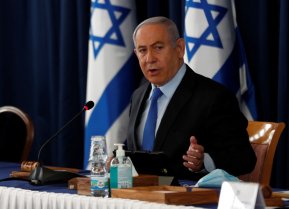Is Israel Slowly Building a Military Alliance in Persian Gulf?
Upgrades to existing relationships are only upgrades and nothing more. “Peace agreements” is a misnomer when applied to such upgrades.
Israel is following up expansion of its diplomatic presence in the Persian Gulf by promoting, according to a report from the Israeli television channel i24News, a “defense alliance” to include itself, Bahrain, the United Arab Emirates, and Saudi Arabia. The would-be Arab members of the alliance appear wary of getting that deeply in bed with Israel, but the move puts into perspective the recent upgrading of relations between Israel and several Arab states.
Few developments have been as overly lauded as this upgrading, on which someone bestowed the august label “Abraham Accords,” as if harmony had suddenly broken out among adherents of the world’s monotheistic religions. Certainly, in general, it is better for all countries in a region to have full relations with all other countries in the region than not to have them, if only as assurance that people are talking to each other. But the main driver of the hosannas for the Israeli-Arab relationship upgrade is not any breakout of goodwill and peace. It is instead the strong desire of the Israeli government to demonstrate that continued festering of its conflict with the Palestinians and continued de facto annexation of Palestinian-inhabited territory will not condemn Israel to pariahdom.
Whatever the Israeli government desires significantly affects, of course, how any matter is treated in American political discourse. In the matter at hand, this connection was especially conspicuous during the Trump administration, which hyped the relationship upgrades not only to appeal to constituencies that follow the Israeli government’s lead but also to claim the upgrades as foreign policy “accomplishments” in a presidency with a scarcity of them.
It is worth recalling that the Trump administration had to bribe Arab governments to move to full diplomatic relations with Israel. For the UAE, the bribe was F-35 stealth fighter jets and other advanced military hardware. For Sudan, it was the removal from a terrorism list. For Morocco, it was the provision of additional arms and abandonment of longstanding U.S. neutrality in the Western Sahara dispute. The bribes demonstrate that the precipitant of the relationship upgrades was not some newfound peaceful intentions on the part of the parties involved.
Upgrades to existing relationships are exactly that, and nothing more. None of the Arab states involved was at war with Israel. They already had significant cooperation with Israel, including on security matters, even without full diplomatic relations. The fact that Saudi Arabia reportedly is talking to Israel about a “defense alliance” in the absence of full diplomatic relations shows that such relations are hardly the defining peace-or-war factor in relationships with Israel. “Peace agreements” is a misnomer when applied to such upgrades.
To the extent that the upgrades are having any effect at all, it is not in the direction of peace. The U.S. bribes have moved things away from peace. The change in policy toward the Western Sahara issue, for example, has intensified tensions between Morocco and Algeria and has complicated international efforts to resolve the issue.
Any prospect of peace between Israel and the Palestinians has only been made more distant. The notion of an “outside-in” settlement involving pressure by Arab governments on the Palestinians fails on the fact that the Palestinians, as the subjugated party, have almost nothing left to concede. Israel is the side with the guns, the power, the land, and the ability to bring about change. Reducing the diplomatic costs to Israel of continued occupation only reduces further whatever inclination it might otherwise have had to accept change.
And in the Persian Gulf, to develop military alliances, or what Israeli defense minister Benny Gantz calls “special security arrangements,” sharpens and intensifies lines of conflict. It draws the Gulf Arabs into the enduring enmity of Israel toward Iran that is laced with threats of military attack. (In saber-rattling just last week, Gantz spoke publicly about lists of Iranian targets that Israel is ready to attack.) It reproduces on a smaller scale the system of enmity and entangling alliances in Europe that helped lead to World War I.
The general principle that it is good for all countries in a region to have full relations with all other countries in the region means all countries. In the Persian Gulf region, this objective would be advanced through a forum with inclusive participation, partly modeled on the Organization for Security and Co-operation in Europe and designed to reduce tensions and increase peaceful cooperation across the Gulf. That would be a development worth labeling with a grand name and touting as an accomplishment.
Paul Pillar retired in 2005 from a twenty-eight-year career in the U.S. intelligence community, in which his last position was National Intelligence Officer for the Near East and South Asia. Earlier he served in a variety of analytical and managerial positions, including as chief of analytic units at the CIA covering portions of the Near East, the Persian Gulf, and South Asia. Professor Pillar also served in the National Intelligence Council as one of the original members of its Analytic Group. He is also a Contributing Editor for this publication.
Image: Reuters


